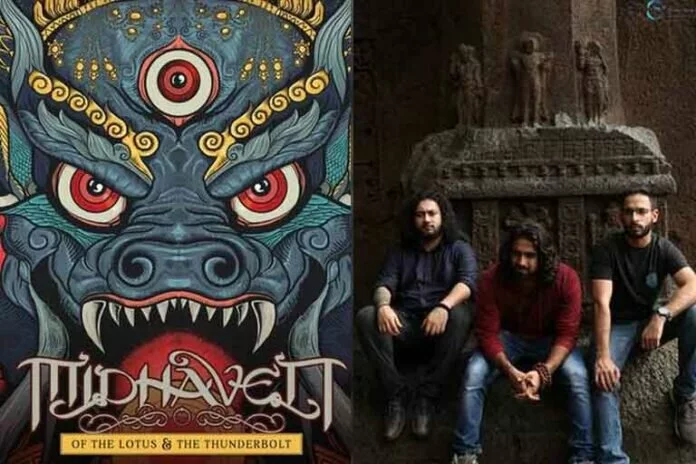
Blending Indian Strains With Progressive Metal, The Seven-Track Album ‘Of The Lotus & The Thunderbolt’ Is A Homage To Shiva As Mahakaal
Every time one sounds the demise knell for heavy steel in India, the headbangers spring to life with a deafening growl. Niche viewers however, steel musicians in India have been constant in making virtuosic music.
The Mumbai-based steel band Midhaven is out with their newest Shiva-inspired idea album Of the Lotus & The Thunderbolt — a seven-track assortment juxtaposing Indian strains with conventional and progressive steel. The band contains Karan R Kaul (vocals/guitar), Aditya Mohanan (guitar /vocalist) and Aviraj Kumar (drums).
Their album explores the idea of time by paying homage to Shiva as Mahakaal – the ‘ruler of time’. Says Aditya, “The album is conceptually philosophical, and time is spoken in a cyclical manner rather than a linear fashion. The Kalpas and Yugas in Jainism, Hinduism and Buddhism are also taken to portray our understanding of universal time.”
With an Indian motif at its core, the album has tracks just like the ‘Para Brahman’ ‘Codeman’, ‘Zhitro’, ‘Mahakaal’ and ‘Bhairav’ amongst others. The album launch was preceded by a video single launch of a heavy-duty monitor known as ‘Primal Song’, the place the primal feelings manifest via riffs and rhythms.
Soul symbolism
On being requested to throw mild on the that means behind the title, Of the Lotus & The Thunderbolt, the band unanimously nominates Aditya for the job and he holds forth. “This is heavily inspired by Vajrayana Buddhism that is practised in Tibet — a combination of Buddhist elements and Tantra at the same time. There’s a lot of symbolism at play. Lotus is a beautiful flower that grows out of the muck. For us, the lotus translates into the human soul and then there’s the vajra, which means a thunderbolt, which in tantra is described as latent potential within every soul to attain emancipation. So the album is about the human soul going through a cycle before reaching the state of moksha.”
Stating that steel bands need to battle to be heard in India, Aviraj says, “Metal is not mainstream for sure. But, not all artists have the same following, right?” Though it’s tempting to imagine that the rebellious rage and aggression of steel is what makes it difficult for an Indian viewers, introduced up on softer melodies and catchy movie music, to understand, Aditya says it’s extra as a result of steel is a distinct segment style. “I have grown up seeing a lot of anger in India… metal is not accepted because people don’t understand it.”
Making of Midhaven
Midhaven’s journey began in 2010 when Karan and Aviraj realised they needed to make comparable music. In 2012 they fashioned a four-piece band and launched a few information by 2016. Then got here their album Spellbound with Universal Music. A cut up within the band noticed the exit of some members and the entry of Aditya in 2017.
Karan, who calls himself an beginner astronomer explains the method behind the identify of the band. “While in astrology ‘mid heaven’ means something else, in astronomy it means a local self-point, the one celestial object that is directly above you is mid heaven. So I was playing on the word and arrived at ‘mid haven’.”
The three musicians have very completely different day jobs: Karan is a e-sport coach, Aviraj is an promoting and advertising and marketing skilled and Aditya, a budding archaeologist. “We do separate things but come together to invest money and time in making music,” says Karan.
Although individually all three created completely different sort of music, as Midhaven band, they create pure Indian steel. “Indian metal is at a weird stage right now, it had its ups and downs,” says Karan, including “Right now it is in limbo and could go anywhere: it could stop tomorrow or could blow up.”